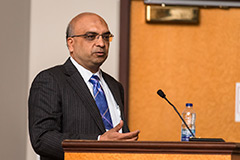Anatomy of a startup
By Alisa Kim
On June 16, 2014, Sunnybrook Research Institute (SRI) and the Schulich School of Business at York University hosted the second annual Schulich Innovation Research Day. Researchers, clinicians, trainees, staff and personnel from the private sector flooded Sunnybrook’s McLaughlin lecture hall to hear talks by seasoned entrepreneurs and other experts on taking new products to the medical marketplace.
Dr. Graham Wright, director of the Schulich Heart Research Program at SRI and one of the event’s organizers, gave an overview of the day. “We’ve made innovation central to our mission of translating ideas into clinical practice,” he said. “It’s been a wonderful journey working with the Schulich School of Business putting together the first year, which focused on going from an idea to the first round of funding. This year it’s about taking the next step.”
In all, there were nine talks organized around three sessions stemming from the theme of early-stage medical companies.
In the first session on developing a team and a commercialization strategy, keynote speaker Dr. Arun Menawat, chief executive officer of Novadaq Technologies, talked about growing a startup company into a multinational corporation. Menawat, whose company specializes in surgical imaging systems, advised participants to think about global markets and emphasized the need to understand trends in health care to be able to provide solutions to challenges such as those associated with aging populations.
Dr. Charles Cunningham, an imaging physicist at SRI, spoke on applying for Health Canada approval to do clinical trials for an injectable contrast agent for magnetic resonance imaging. The biomolecule, hyperpolarized carbon-13-labelled pyruvate, enables imaging of metabolic changes in tissue that are indicative of disease.
Cunningham noted that safety and quality control of the pyruvate are the main issues, but that discussions with Health Canada have been encouraging. He plans to test the contrast agent in patients with cancer and cardiac conditions.
The second session focused on early funding and product development. Participants learned how to build a financial model for investors to review from Dr. Andy Haigh, a senior associate at Lumira Capital, a life sciences venture capital firm.
Kris Shah, co-founder of Baylis Medical, a company that makes devices for cardiology, radiology and spine applications, stressed the importance of the “failing-forward” process. He described how his team learned from mistakes, made adjustments and moved on to become an international firm.
In the third session on pitching an idea, keynote speaker Dr. Michael Laufer gave tips on making a successful pitch. Laufer—who wears many hats, including doctor, engineer, venture capitalist and innovator—told the audience that the pitch should be succinct, clear, memorable and engaging, and convey passion about the idea. He counselled participants to distill complex technologies into straightforward concepts and to be prepared for opportunities to sell their ideas.
The event also featured a competition in which four teams pitched their innovations to an expert panel comprised of some of the day’s speakers. Modelled loosely after the television show Dragon’s Den, the competition enabled teams to get feedback on their proposals, including areas of improvement and commercial potential. The winning technology was software that does clinical imaging of nerve pain and nerve disorders.
Wright concluded the event by thanking the speakers and organizers and noting that he and the organizing committee aim to foster a culture of innovation and entrepreneurship at SRI. He also thanked the participants, encouraged them to network and invited them to attend the monthly Schulich Innovation seminars held at SRI.







